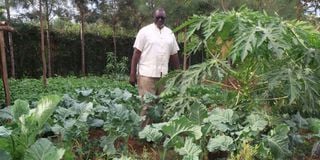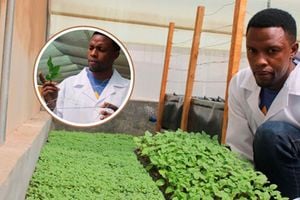
Some of the vegetables that
Philip Anyango tends to his crops at his farm in Kokumbo Village in West Kochia Location in Homa Bay County.
Residents of Kokumbo village in Homa Bay County arrive at the homestead of Philip Anyango to buy fruits and vegetables daily.
The farm feeds hundreds of families in the village. Without it, locals would have to walk for at least five kilometres to Olare market.
Apart from farming, the retired medical engineer is involved in consultancy.
“I needed to be involved in an activity that coud keep me busy in retirement,” the farmer says.
Anyango and his wife started horticulture in 2017. They grow traditional vegetables, mangoes, bananas and other crops. He harvests up to 10 kilos of vegetables a day.
“My two employees tend to the crops and do the selling,” Anyango says.
Unlike neighboring homes, Anyango’s farm is green and crops are fresh. Other farmers in the village have wilted and unhealthy crops.
Rangwe Sub-County experiences drought for most parts of the year, discouraging many families from venturing into crop production. Climate change has made the situation worse as farmers struggle to understand the changing weather patterns.
In 2022, Anyango lost all his crops to drought.
“I expected good yields but all the crops died when the rains failed,” he says.
It was an eye-opener. The retired medical engineer then took the decision to invest in irrigation using solar energy.
He says climate change has made crop farming unreliable, especially in areas with water supply challenges. He sank a borehole in his farm in August, and is using the water to irrigate his vegetables and fruits.
“I had realised that relying on rainfall would lead to huge losses. One cannot sustain horticulture without water,” the farmer says.
Anyango spent Sh750,000 to address the water problem at his farm once and for all.
All along, he has been relying on rain-fed agriculture. When it rained, he would collect rainwater in a tank and use it to water his crops.
But this was not sustainable. Water in the tank would be depleted before it rained again.
“Crops cannot grow without water. Farmers are risking when they depend on rain to grow crops,” Anyango says.
During dry spells and when his tank was empty, the farmer had to source for water directly from Lake Victoria.
Water from the lake would be supplied by vendors using donkeys and motorcycles. But this was equally unsustainable and unreliable.
“We were not getting any profit from farming. We spent a lot to pay vendors when the money could have been used to expand the farm,” Anyango says.
The borehole at the farm is able to produce at least 2000 cubic metres of water in one hour. The borehole has a pump that runs on solar energy.
The farm has nine panels that generate 1800 watts of electricity. After water is pumped from underground, it is stored in a 10,000 litre water tank before it is manually taken to the farm.
“I have procured sprinklers and will soon make automatic watering. This will ensure water is sprinkled evenly in the farm for all the crops,” Anyango says.
Besides crops, the farmer has poultry which are equally benefiting from the solar project. The farm has up to 400 birds which are kept in an enclosed space. Every day of the week, the poultry are fed and given water to drink.
Before the borehole was built, Anyango says workers would take water to the poultry house three times every day.
But sometimes they would forget and risk wiping out all the birds.
“Currently, water flows directly from an overhead tank into automatic drinkers. This ensures the birds get water anytime they want and also eliminates risks of transmitting diseases as workers do not enter the poultry house more often,” the farmer says.
Following the success of the solar project, Anyango says he has lined up a number of activities that will enable her to produce more food.
It includes introducing new crops to the farm. He also intends to support his immediate neighbours by irrigating their farms by supplying them with water through pipes.
The farmer explains that the amount of water produced from the borehole is enough to support a larger farm.
“I do not anticipate any breakdown in the solar system. I have other panels that serve my house and they have been operating for more than four years,” Anyango says.
Meanwhile, water from the borehole will be taken to a chemist for chemical analysis.
Anyango says the water has no effect on the crops even though it is slightly saline when one drinks it.
Climate change experts advise farmers in regions that do not have enough or unpredictable rain to invest in irrigation.
Clifford Omondi, a climate scientist and a member of the Environment Institute of Kenya says farmers need to have constant water supply to ensure they overcome challenges posed by climate change.
“One of the best solutions for addressing challenges posed by climate change in agriculture is to have a borehole. Solar powered boreholes are the best because they beat unreliable electricity supply,” the climate change expert says.









